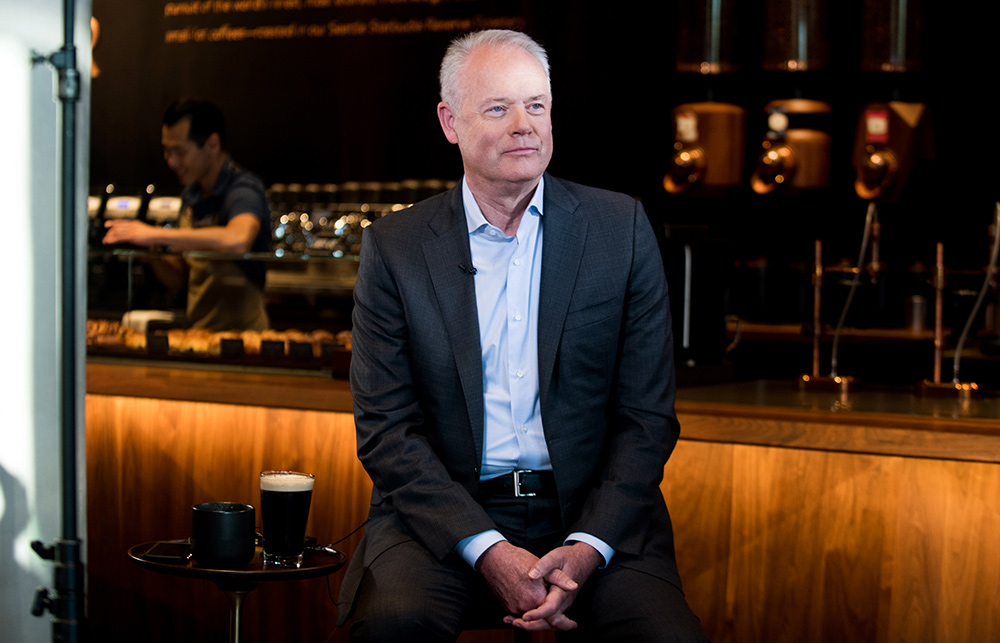星巴克首席执行官凯文•约翰逊认为,疫情无疑会改变全人类的生活状态。“我真的相信,这次的全球疫情会重塑我们此后余生的思考方式以及生活方式。”
最起码,疫情已经改变了星巴克的运营方式。约翰逊本人把星巴克目前的状态定义为“观察适应期”,在有效疫苗出现之前,这种状态可能会持续18至24个月。“除非有疫苗,否则我们必须学会接受要与病毒长期共存的事实,全人类都应该意识到这一点。”约翰逊在本周四举办的全美零售业领导人在线会议上说道。

星巴克在中国也布局了不小的市场。在疫情爆发初期,约翰逊就预见到了可能会发生的后果。“我从1月中旬开始,就和星巴克中国的管理层一起着手处理疫情下的运营事宜,很显然,疫情会影响到全球所有市场。”后来,全球各国都相继爆发出新冠肺炎病例,星巴克在中国的早期经验则有效地帮助了该企业快速制定疫情下的特殊经营方案。
约翰逊表示,尽管疫情还在继续,但星巴克已经摸索出了一套新常态下的运营之道,很好地走出了危机状态。“所有的零售商都必须接受这种新环境,”他认为,在当下,顾客与店主之间的互信关系尤为重要,“如果顾客愿意信任店主,愿意相信店主会竭尽全力地创造一个安全卫生的消费环境的话,一切都会顺利的多,即便在疫情之后,这种互信关系也会被延续下来。”
为了取得消费者的信任,星巴克为店内所有的员工提供口罩,并要求他们每隔30分钟洗一次手,还在售货台前装上了塑胶玻璃。约翰逊强调,所有措施都是为了阻绝病毒传播,“如果不能提供一个安全的消费环境,那么星巴克就不用再开业了,甚至整个经济都别指望复苏了。”
另外,星巴克是第一批规定“入店顾客必须佩戴口罩”的零售商之一。就在昨天,这一项规定已经开始强制生效了。
约翰逊指出,在疫情期间,顾客的单笔消费尽管有所上升,但整体消费喜好未改。近年来的一些口味变化趋势还在继续:比起热饮,顾客更偏爱冷饮;植物性饮料及食品越来越受欢迎。几个月前,星巴克还推出了植造肉套餐。
在星巴克的门店扩张策略方面,疫情也对其产生了举足轻重的影响。“这是一个改变门店布局的好时机”约翰逊表示,目前,大量位于市区的商业地产呈现出降价的趋势,星巴克计划借此机会在市中心开设更多“迷你店”——不设座位,即买即走,有点类似于汽车餐厅,只不过把“汽车”换成了“路人”。
“安全、熟悉、便捷的消费体验是现阶段的重中之重。”约翰逊说道。(财富中文网)
编译:陈怡轩
星巴克首席执行官凯文•约翰逊认为,疫情无疑会改变全人类的生活状态。“我真的相信,这次的全球疫情会重塑我们此后余生的思考方式以及生活方式。”
最起码,疫情已经改变了星巴克的运营方式。约翰逊本人把星巴克目前的状态定义为“观察适应期”,在有效疫苗出现之前,这种状态可能会持续18至24个月。“除非有疫苗,否则我们必须学会接受要与病毒长期共存的事实,全人类都应该意识到这一点。”约翰逊在本周四举办的全美零售业领导人在线会议上说道。
星巴克在中国也布局了不小的市场。在疫情爆发初期,约翰逊就预见到了可能会发生的后果。“我从1月中旬开始,就和星巴克中国的管理层一起着手处理疫情下的运营事宜,很显然,疫情会影响到全球所有市场。”后来,全球各国都相继爆发出新冠肺炎病例,星巴克在中国的早期经验则有效地帮助了该企业快速制定疫情下的特殊经营方案。
约翰逊表示,尽管疫情还在继续,但星巴克已经摸索出了一套新常态下的运营之道,很好地走出了危机状态。“所有的零售商都必须接受这种新环境,”他认为,在当下,顾客与店主之间的互信关系尤为重要,“如果顾客愿意信任店主,愿意相信店主会竭尽全力地创造一个安全卫生的消费环境的话,一切都会顺利的多,即便在疫情之后,这种互信关系也会被延续下来。”
为了取得消费者的信任,星巴克为店内所有的员工提供口罩,并要求他们每隔30分钟洗一次手,还在售货台前装上了塑胶玻璃。约翰逊强调,所有措施都是为了阻绝病毒传播,“如果不能提供一个安全的消费环境,那么星巴克就不用再开业了,甚至整个经济都别指望复苏了。”
另外,星巴克是第一批规定“入店顾客必须佩戴口罩”的零售商之一。就在昨天,这一项规定已经开始强制生效了。
约翰逊指出,在疫情期间,顾客的单笔消费尽管有所上升,但整体消费喜好未改。近年来的一些口味变化趋势还在继续:比起热饮,顾客更偏爱冷饮;植物性饮料及食品越来越受欢迎。几个月前,星巴克还推出了植造肉套餐。
在星巴克的门店扩张策略方面,疫情也对其产生了举足轻重的影响。“这是一个改变门店布局的好时机”约翰逊表示,目前,大量位于市区的商业地产呈现出降价的趋势,星巴克计划借此机会在市中心开设更多“迷你店”——不设座位,即买即走,有点类似于汽车餐厅,只不过把“汽车”换成了“路人”。
“安全、熟悉、便捷的消费体验是现阶段的重中之重。”约翰逊说道。(财富中文网)
编译:陈怡轩
To Starbucks CEO Kevin Johnson, there’s no question that COVID-19 will change humanity. “I do believe that this global pandemic will reshape the way we think about and live the rest of our lives,” he said.
The virus has already changed the way the company runs its stores. The global retail giant is in what Johnson called a “monitor and adapt phase,” following a playbook that will likely guide the company for the next 18 to 24 months while the world waits for a widely available vaccine, or multiple vaccines, he said.“Until there’s a vaccine,” Johnson said, “everyone around the world is going to be aware that we have to live in a world with COVID-19.” Johnson made his comments Thursday as part of the National Retail Federation’s virtual leadership series.
Through its operation in China, Starbucks had an early look at how the virus might impact the world. Johnson said he started to get involved with the leadership team in China’s COVID-19 response in mid-January, and it was quickly “evident [that the virus] would be something that would impact all markets around the world.” As the virus moved to other parts of the globe, the company adapted the safety protocols it had created for China in various regions.
Johnson said that even though the pandemic is ongoing, the company is no longer in crisis mode, because it has figured out how to operate in this new environment. “We’re in a position now where we accept that is the new reality until there’s a vaccine,” he said. “This is the new environment that all retailers have to operate under.” Johnson said this moment is a chance to build a sense of trust with customers; if they believe retailers are creating safe environments for them, that trust will continue beyond the pandemic, he added.
Starbucks has provided all of its store employees with facial coverings, installed plexiglass at the point of sale, and instituted employee hand-washing on a 30-minute basis. The protocols, he said, were grounded in its work of understanding the science behind the spread of COVID-19. “If we don’t provide a safe environment, we and the economy can’t expect to reopen.”
Starbucks was one of the first retailers to say that it would require customers wear face coverings in its stores, a mandate that went into effect yesterday.
Johnson noted that while the average amount spent per transaction had increased during the pandemic, the product mix was essentially unchanged. Trends that had already emerged were continuing: cold beverages outselling hot drinks and the move toward plant-based beverages and food. Earlier this summer, Starbucks started offering breakfast sandwiches made with Impossible Foods’ plant-based sausage patty.
However, the pandemic does have the potential to remake the company’s store footprint. With a significant amount of commercial real estate likely available in urban areas—at what Starbucks believes will be a lower rate—the company is going to “take this opportunity to transform its store portfolio,” Johnson said. Starbucks is planning on opening more rapid pickup stores in urban areas—what are essentially the pedestrian equivalent of a drive-thru.
“The concept of experiences that are safe, familiar, and convenient,” Johnson said. “That’s going to be the theme until a vaccine or multiple vaccines are available.”






